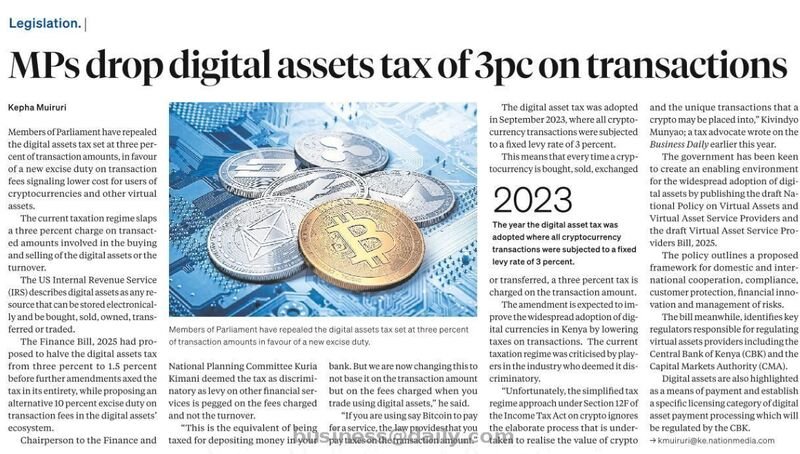In Brief
-
Kenya crypto tax repealed, the controversial 3% transaction tax replaced with a 10% excise duty on exchange fees.
-
The move followed intense advocacy from crypto exchanges and PwC, emphasizing innovation and fair regulation.
-
Kenya positions itself as a regional leader in balanced digital asset legislation, influencing East Africa’s Web3 future.
Kenya’s crypto community breathed a sigh of relief with its National Assembly voting to repeal the 3% digital assets tax.
The decisive decision now only awaits the president’s approval, reverting tax applications on every crypto purchase, sale, exchange or transfer.
The Kenya crypto tax laws now take a new approach, as many crypto stakeholders banded together to showcase how the law would stifle growth rather than improve it.
The Burden of the 3% DAT: A Flawed Approach?
Kenya is among the top pioneers of Africa’s crypto industry; thus, the introduction of the 3% DAT mandate sparked immediate backlash from its community.
For once, stakeholders ranging from exchanges, blockchain startups, to individual traders, advocacy groups and leading Web3 leaders raised loud concerns.
The core argument was simple yet rippled a collective concern; the 3% tax targeted the gross value of crypto transactions rather than the profit or the service fee.
This approach would inherently create an undue and inappropriate burden on users, creating a significant disincentive for using a regulated platform in Kenya.

Kenya’s crypto laws now replace a 3% transaction tax with a 10% excise duty on VASP fees, reducing the trader’s net cost to 0.1%. [Photo: LinkedIn]
Furthermore, the law compelled exchanges to remit collected taxes within just five days to the Kenya Revenue Authority, a fact frowned upon by many.
It would risk stifling local innovation and, as previously seen, African traders have a knack for opting towards harder-to-regulate decentralized platforms if given no alternative.
The Turning Point: Unified Industry Advocacy
Nothing brings together fragmented voices like a common enemy, and the Kenya crypto tax proved a worthwhile foe.
Soon, key players like Swypt, Busha, HoneyCoin, Luno and GoChapaa banded together, recognizing the tax would hit hard on their operations.
This unified front enlisted the expertise and credibility of professional services firm PwC to present a compelling case to the Kenyan Parliament.
They highlighted the need for the digital asset tax repeal, citing various impacts such as potentially pushing activity underground and its misalignment with standard taxation principles.
This front initially paid off with lawmakers reducing the DAT to 1.5%.
CHECK OUT:Kenya Fast-Tracks Crypto Regulations with Lawmaker Training Backed by Binance
However, following committee stage discussions heavily influenced by the industry’s submissions, a more radical solution emerged: the complete repeal of Section 12F of the Income Tax Act (which housed the DAT) and its replacement with a 10% new excise duty on crypto fees.
This means, instead of taxing the transaction value, the governments will only levy a 10% excise duty on the transaction fees charged by exchanges, wallet providers and other VASPs.
Kuria Kimani, Chairman of the National Assembly’s Finance and National Planning Committee, clarified the rationale:
“We are now changing this not to base it on the transaction amount, but on the fees charged when you trade using digital assets. If you are using, say, Bitcoin to pay for a service, the law provides that you pay taxes on the transaction amount.“
Kenya as a Regional Beacon for East African Crypto Policy
Kenya’s decisive shift away from the blunt 3% DAT speaks volumes to its determination to develop an adaptive digital asset regulation.
The region’s approach to crypto transaction tax and law acts as a blueprint, with neighbouring nations already taking notes.
The willingness to listen to industry concerns and adapt based on evidence of unintended consequences fosters growth in a new space.
The crypto tax impact for everyday traders is drastically reduced. Under the new system, the excise duty is 10% on that 1% fee, resulting in a net cost to the trader of just 0.1% – a thirty-fold decrease.
Furthermore, it coincides with Kenya’s recent Virtual Asset Service Providers Bill 2025.
The draft establishes a comprehensive licensing regime with the main aim of protecting consumers from Ponzi schemes and rug pulls.
What Comes Next?
The Finance Bill 2025, containing the DAT repeal and the new 10% excise duty, now moves to the Senate for concurrence before being presented to President William Ruto for assent.
Its implementations, if approved, will commence within the next fiscal year, while the VASP bill will undergo public participation, with a licensing framework likely to follow soon after.
CHECK OUT:Record $13.2B Crypto ETF Inflows Signal Market Surge
The Kenyan crypto regulations might have had a controversial start. Still, with the digital asset tax repeal, it has taken a major leap towards creating a more balanced, growth-oriented environment.
While the speed at which the CBK and CMA establish operational guidelines will be watched closely, the direction is clear.
Kenya is drafting East Africa’s crypto laws, and getting it right is a non-negotiable fact if the region is to continue dominating the space alongside Nigeria and South Africa.


1 comment
[…] CHECK OUT: Kenya Scraps 3% Crypto Tax: New Fee-Based System Explained. […]